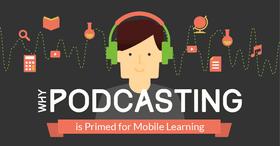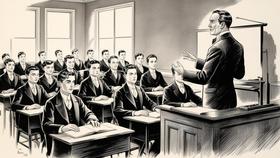Are you a 21st-century teacher? Are you adapting to new ways of doing things? Are you challenging your students to think critically? Are you preparing them to become global citizens? Yes, I know that you have taught for years. Your students have achieved excellent scores in their Advanced Placement exams. You are highly regarded both in your school community and within your profession. Again, I ask whether you can call yourself a 21st-century teacher. Let's review some of the characteristics the 21st-century teacher has and why these characteristics are so important.
It's a different world.
As the United States faces unprecedented challenges both at home and abroad, the need for schools to have teachers with a 21st-century viewpoint and 21st-century skill sets has never been more obvious. Dynamic, visionary teachers are needed to shape the minds of new generations of citizens who will have the abilities and creativity to lead and guide our country. If this sounds radical, it really isn't. It is the same principle and thinking which caused the Phillips family of Exeter and Andover fame to found those highly-rated schools back during the American Revolution. Those school founders knew that the infant nation needed well-schooled, well-trained people to lead it in the years ahead. They believed in this country and the concept of universal education so deeply that they put their money where their mouth was and created schools that still, to this day in the 21st century, reflect extraordinary dynamism and vision. With that thesis as our backdrop let's look at what is needed to be a 21st-century teacher.
Here is how Andover positions itself in the 21st century:
"Our energetic, one-of-a-kind educational community ultimately helps young people grow intellectually, artistically, athletically and morally. Smart and curious students from 50 states and 34 countries study with teachers and scholars who are also coaches, mentors, house counselors, advisors, and inspirations."
The important concept to understand about private schools is that they are constantly evolving, growing, and adapting to changing market conditions and other circumstances. Private schools have to do this in order to survive. If they remain static, they will go out of business. Look at Harvard-Westlake School in Los Angeles. This school has been around since 1900. As you read the school's history, you realize that each generation has left its imprint on the school. Each head of school and board of trustees has positioned the school so that it can not only survive in the market and social conditions of the time but also be poised to be successful in the years to come. That is just good stewardship. Prescient, thoughtful boards and heads of school know this. I maintain that teachers need to adapt to changing conditions as well in order to survive professionally.
Your viewpoint
A 21st-century viewpoint includes teachers right across the K-12 spectrum. While things technological are not critical in the formative, early years, empowering children to discover and to learn most certainly is. Here are some concepts that 21st-century teachers need to employ in their day-to-day teaching.
- Teach children that they are part of a global community.
- Teach children to appreciate diversity in all its aspects.
- Teach children to be tolerant.
- Teach children to be aware of the many societies and civilizations which came before them.
- Teach children to be sensitive to the environment.
- Teach children the importance of nutrition, exercise, and health.
- Teach children to appreciate the arts.
- Teach children to think critically.
- Teach children to think analytically.
- Teach children to think creatively.
These fundamental concepts were the foundation of the philosophies of great 20th-century educators such as Maria Montessori, Rudolf Steiner, Francis Parker, and John Dewey. We have gotten away from allowing children to be creative, to use their imaginations, to be scientists, and to discover. We encourage passivity with television and all the other forms of electronic entertainment.
Your skill sets
The 21st-century teacher needs to be a digital native. While older teachers will inevitably be digital immigrants, at the very least they must be willing to adapt and change to presenting their subjects in new ways. Modern living in the 21st century is internet-based. We get our information directly from the source. Knowing how to manage RSS feeds, Google and all the other electronic gadgets at our disposal and as yet undreamed of is an important skill for any 21st-century teacher to have.
The following short video gives you an idea of what is involved.
The 21st-century teacher needs to be able to filter news and information. Decades ago we could listen to Walter Cronkite and know all we thought we needed to know. Now news and information come at us like a veritable electronic blizzard. Before we can teach our students how to filter all this data, we must know how to filter it efficiently ourselves.
While discovery in the primary grades is mostly centered on the immediate world around a child, a young adult discovers in another way as well. The ubiquitous search engine is his tool for discovery. Unfortunately, unless the 21st-century teacher understands how to write a good search string and how to filter search engine results, he will be unable to teach the young adult how to do the same. Sifting through all the data and making sense of it is a critical skill every middle and high school student needs to have.
Where are our 21st-century Euclids and Einsteins? The sad truth is that they are out there just waiting to be empowered. But as long as society glorifies athletes and entertainers with enormous earnings and constant adulation, then why on earth would any young person want to grapple with solving the Fermat Theorem? The 21st-century teacher understands this and provides the example, the role models, and the encouragement needed to nurture and mold the scientists, mathematicians, and engineers our country so desperately needs.
Conclusion
If you have read this far, you will see how over the decades, indeed over the centuries, the teacher's role has not changed very much at all. Teachers still encourage and empower, guide and shape young minds. Lighting the fires of learning and discovery will always be what a good teacher does. The difference for the 21st-century teacher is that she must adapt her skill set to suit the needs and exigencies of the present, not the past. If she and thousands of her colleagues can do that, our great nation will continue to lead, not follow.
That is why it is so important for you to be a 21st-century teacher. You hold the power to make a difference. You really do. And when you, the school, and parents commit to producing well-rounded, knowledgeable, tolerant graduates, great things will happen.
Questions? You can reach me via Facebook: @privateschoolreview





















